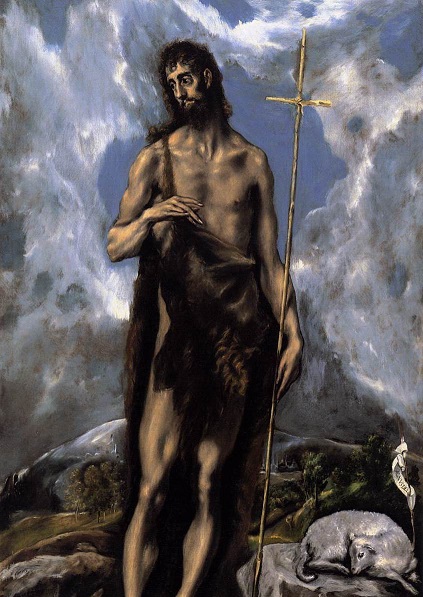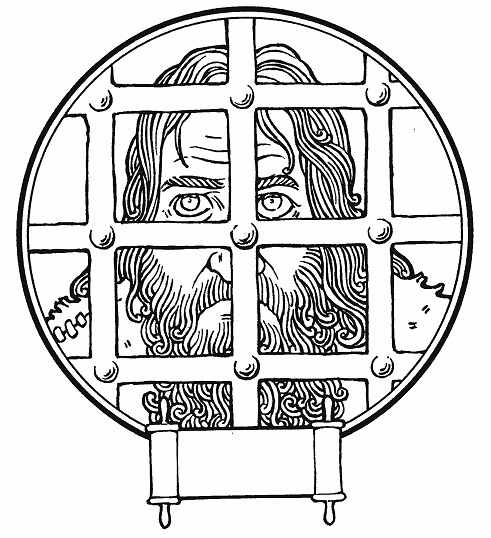~ Gaudete ~
Readings: Isaiah 40:1-11 | 1 Corinthians 4:1-5 | Matthew 11:2-11
Text: Matthew 11:2-11
We hear from the Epistle to the Hebrews, “In many and various ways, God spoke to His people of old by the prophets, but now in these last days, He has spoken to us by His Son.”[1] But what do we think of when we hear about prophets? Men with unkempt beards and long robes, whether they’re as eccentric as Ezekiel or a member of the court like Nathan.

And when we think of what prophets say, we usually think of judgment and condemnation—“Even now the axe is laid at the root of the trees” (Matt. 3:10). Yet, God sent His prophets with a two-fold message. Yes, there was condemnation for unbelief, but to the repentant, there was also the soothing words of comfort.
The name for this Sunday, Gaudete, meaning “Rejoice!” is from Philippians 4:4, where St. Paul says very memorably, “Rejoice in the Lord always. Again, I will say, Rejoice!” This really sums up the goal for God sending His prophets. Much more than the wet blanket that people usually took them for, God’s prophets brought genuine cause for rejoicing in the Lord.
The Old Testament reading from Isaiah is a perfect example of this. Hear what the Prophet wrote, “Comfort, comfort my people, says your God. 2 Speak tenderly to Jerusalem, and cry to her that her warfare is ended, that her iniquity is pardoned, that she has received from the Lord’s hand double for all her sins.”[2] What cause for rejoicing! You know that sin which God rightly condemned? It is pardoned. God spoke through Isaiah and said that Jerusalem’s warfare was ended—even while Babylon was getting ready to pillage the city. The warfare was between God and us. And One was coming who would bring terms of peace,[3] the very same One who would pardon our iniquities. And this is none other than Jesus Christ. In the full pardon of His death and resurrection, sinners would receive this double blessing of peace and forgiveness for their sins.
When John the Baptist came, it was he that Isaiah was writing about: “A voice cries, in the wilderness prepare the way of the Lord; make straight in the desert a highway for our God.”[4] That’s exactly why God sent him: to prepare the way for the His Son, Jesus Christ. In chapter 3 of his Gospel, St. Matthew tells us that John came with the message, “Repent, for the kingdom of heaven is at hand.”[5] Again, it was a message of repentance, but for all who heard it in faith, it was a message of comfort—a cause for rejoicing in the Lord. John was the last prophet and was sent to proclaim the imminent coming of God’s Kingdom. Many expected God’s Kingdom to be a great breaking into the world, with a show of force and fire from the sky.[6] But in fact, John’s preaching about the Kingdom of Heaven pointed to the Lamb of God, who takes our sins away.

Like so many prophets before him, John was not well received by Israel’s ruling class. John found himself in prison because of what King Herod Antipas thought of God’s call to repentance. And from prison, John sends his disciples to Jesus. He may have been arrested, but he was still carrying out his prophetic call. He tells them to ask Jesus, “Are you the one who is to come, or shall we look for another?” In case John’s proclamation on Jordan’s bank wasn’t enough, “Behold! The Lamb of God who takes away the sin of the world!”[7] he adds still more testimony. And the testimony is in Jesus’ reply: “Go and tell John what you hear and see: 5 the blind receive their sight and the lame walk, lepers are cleansed and the deaf hear, and the dead are raised up, and the poor have good news preached to them. 6 And blessed is the one who is not offended by me.”
The proof that the Kingdom of Heaven has come is not in fiery signs from above or the spilled blood of unbelievers. It’s in the Gospel preached to blind, lame, deaf, dead, and poor sinners! And Jesus is the Coming One who all the prophets up through John had foretold. In Jesus Christ, the Lord, the lowly are exalted, and the rich are sent away empty.[8] He brings good news for sinners who have been slain by the Law, and rebuke for the proud who boast in their own righteousness. This is truly cause to rejoice in the Lord!
And blessed are those who see this good news as the coming of the Kingdom. Those who are looking for an earthly kingdom, where Jesus reigns supreme over all the ungodly, will be greatly disappointed. Those who expect the Church to be filled with flawless people with flawless lives will also be greatly disappointed. The Kingdom of Heaven is filled with sinners who have been called by the Savior and washed in His blood. The blind, the lame, the lepers, the deaf, and the dead—all have hope in the Lord who makes them well.

God spoke to His people of old by the prophets, but now He has spoken to us by His Son. God still speak to us by His Son. All the prophets pointed ahead to Christ until He appeared. Once the glory of the Lord was revealed in the flesh,[9] God stopped raising up prophets like John, Malachi, or Zechariah. But He still sends servants who point to Christ, and they still bring cause for rejoicing. They are the Lord’s pastors. Like John, they preach repentance and pardon for iniquities. They are now the ones who prepare the way before His coming in glory.
So, even though the “Prophets prophesied until John”[10] the Lord is still preaching His Gospel to the poor. St. Paul explained this in the Epistle, saying, “This is how one should regard us, as servants of Christ and stewards of the mysteries of God.”[11] Pastors are servants of Christ, sent to bring His powerful Word to you. It is a Word which convicts and calls you to repent. But more than that, it is the Word of Christ, who brings you good news in the forgiveness of your sins. God’s pastors bring you cause for rejoicing in the Lord!
However, just as it was for John, there are many who misunderstand the pastor’s ministry. “What did you go out in the wilderness to see?” the Lord asks us today. If you came looking for a pastor whose charismatic personality will attract droves of people, you will be greatly disappointed. If you came looking for a pastor who is a visionary leader like a CEO, then you won’t be satisfied. If you’re looking for a pastor who makes you feel good about yourself with motivational sermons on Christian living, look somewhere else (but don’t really, because you won’t find Christ’s life there)
But, if you are looking for a pastor who is like John the Baptist—who has a godly love for you, who will speak God’s Word of repentance and heal you with the life-giving forgiveness of Christ—then you are in the right place! In this Christian Church, Christ brings good news to the poor through His pastors. He sends you cause to rejoice in Him. Pastors are “stewards of God’s mysteries”—the Sacraments which bestow good news to the poor, and give them cause to rejoice: the gracious washing of Holy Baptism, the unbinding word of Holy Absolution, and the death and sin-defying food of Holy Communion. The Lord’s servants are sent to you, “knowing nothing except Jesus Christ, and Him crucified.”[12] Such prophets God graciously raises up in each generation. They bring Christ to you, because only in Him will you find the forgiveness of sins, the resurrection of the body, and the life everlasting. There is ample cause to rejoice in the Lord always! In the Name + of Jesus. Amen.

[1] Hebrews 1:1-2
[2] Isaiah 40:1-2
[3] Luke 19:41-42
[4] Isa. 40:3
[5] Matthew 3:2
[6] Luke 9:54
[7] John 1:29
[8] Luke 1:51-53
[9] Isaiah 40:5
[10] Matthew 11:13
[11] 1 Corinthians 4:1
[12] 1 Cor. 1:23







